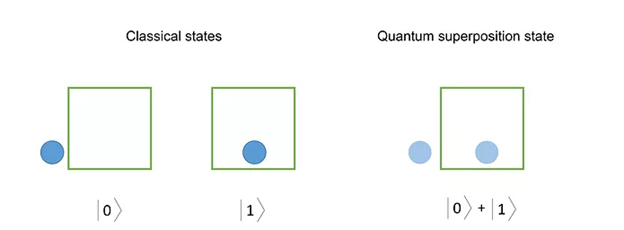Editor’s note: “Quantum Computing Jackpot: Latest Selloff Unlocks A Fantastic Opportunity” was previously published in January 2025 with the title, “Quantum Computing Revolution: The Gargantuan Opportunity Investors Shouldn’t Ignore” It has since been updated to include the most relevant information available.
Throughout late 2024, quantum computing stocks were all the rage on Wall Street. To be sure, trades like IonQ (IONQ), Quantum Computing (QUBT), D-Wave Quantum (QBTS), and Rigetti Computing (RGTI) soared hundreds of percent in a matter of months.
But earlier this week, when Nvidia (NVDA) CEO Jensen Huang said that truly useful quantum computers are still likely around 15 years away, that red-hot rally hit a brick wall. Many related stocks dropped more than 40%… in just a day.

Did Huang just end the quantum stock bull run? Or did he give investors a great buying opportunity?
And since quantum computing represents a technological paradigm shift potentially as transformative as the discovery of fire or the invention of the wheel, this could be an investment opportunity for the ages.
To understand why, we’ll need to take a deep look into this groundbreaking technology.
What Is Quantum Computing?
Let me start by saying that the underlying physics of this technological breakthrough – quantum mechanics – is a highly complex topic. It would likely require over 500 pages to fully understand.
But, alas, here’s my best job at making a Cliff’s Notes version in 500 words instead.
For centuries, scientists have developed, tested, and validated the laws of the physical world, known as classical mechanics. These scientifically explain how and why things work, where they come from, so on and so forth.
But in 1897, J.J. Thomson discovered the electron. And he unveiled a new, subatomic world of super-small things that didn’t obey the laws of classical mechanics… at all. Instead, they obeyed their own set of rules, which have since become known as quantum mechanics.
The rules of quantum mechanics differ from that of classical mechanics in two very weird, almost-magical ways.
First, in classical mechanics, objects are in one place at one time. You are either at the store or at home, not both.
But in quantum mechanics, subatomic particles can theoretically exist in multiple places at once before they’re observed. A single subatomic particle can exist in point A and point B at the same time until we observe it. And at that point, it only exists at either point A or point B.
So, the true “location” of a subatomic particle is some combination of all its possible positions.
This is called quantum superposition.

Entanglement
Second, in classical mechanics, objects can only “work” with things that are also “real.” Of course, you can’t use an imaginary friend to help move the couch. You need a real friend instead.
But remember how the true location of a subatomic particle is the combination of all of its probabilistic states? Well, all those states are not independent; they’re entangled. So, if we know something about the probabilistic positioning of one subatomic particle, then we know something about the probabilistic positioning of another. It’s all connected. And that means that theoretically, all of these probabilistic states can work together, all at once, to create a super-complex ecosystem.
This is called quantum entanglement.
Between entanglement and superpositioning, subatomic particles can theoretically have multiple probabilistic states at once. And all those states can work together – again, all at once – to accomplish some task.
Pretty wild, right?
It goes against everything classical mechanics taught us about the world. It goes against common sense. But it’s true. It’s real. And now, for the first time ever, we are learning how to harness this unique phenomenon to change everything about everything…
That is why some folks think quantum computing could be more revolutionary for humankind than the discovery of fire or the invention of the wheel.
And I agree.
Mark my words. Quantum mechanics could very well reshape our world over the next few years. And some investors may end up making a lot of money because of it.
Quantum Computing Will Change the World
You see; the study of quantum theory has made huge advancements over the past century, especially so over the past decade.
Scientists at leading laboratories and tech companies have started figuring out how to harness the almost-magical powers of quantum mechanics to make a new generation of super quantum computers. These devices are infinitely faster and more powerful than even today’s fastest supercomputers.
In the words of Haim Israel, Bank of America’s head of Thematic Research:
“By the end of this decade, the amount of calculations that we can make [on a quantum computer] will be more than the atoms in the visible universe.”
Again, the physics behind quantum computers is highly complex. But here’s my shortened version…
Today’s computers are built on top of the laws of classical mechanics. That is, they store information on what are called bits, which can store data binarily as either “1” or “0.”
But what if you could turn those classical bits into quantum bits – qubits – to leverage superpositioning to be both “1” and “0” stores at once?
Further, what if you could leverage entanglement and have all multi-state qubits work together to solve computationally taxing problems?
Theoretically, you’d create a machine with so much computational power that it would make today’s most advanced supercomputers seem ancient.
That’s exactly what’s happening today.
The Possibilities Behind Quantum Computing
Earlier this month, Google unveiled its latest quantum processor, Willow.
At that reveal, Google announced that Willow had solved a complex calculation – one that takes its fastest classical supercomputer around 10 septillion years to complete – in just five minutes.
Ten septillion years (which, written out, is 10,000,000,000,000,000,000,000,000) cut down to five minutes…
That is the very real power of quantum computers.
Just imagine the possibilities if we could shorten and simplify all the world’s problems in a similar manner.
We may finally have the level of AI that you see in movies. Arguably the biggest limitation to today’s AI is the robustness of machine learning algorithms, which are constrained by supercomputing capacity. Expand that capacity, and you’d get infinitely improved machine learning algos – and infinitely smarter AI.
We may be able to eradicate disease. Of course, we already have tools like gene editing. But, as with AI, gene editing tech’s effectiveness relies on the robustness of the underlying computing capacity to identify, target, insert, cut, or repair genes. With quantum computing capacity, all that could happen without error in seconds.
What about a million-mile EV? We can only improve batteries if we can test them. And we can only test in the real world so much. Therefore, one way to unlock a million-mile battery is through simulation. And the higher the underlying computing capacity, the faster and more effective the simulations.
There’s seemingly no limit to what such powerful computing capacity could lead us to…
Which means the economic opportunities here are truly enormous.
The Final Word
That is why I state with such confidence that quantum computing is the most underrated and most transformational technological breakthrough since the internet.
In fact, it may be even bigger than the internet.
Of course, this advancement will take time. The Quantum Revolution will likely play out in various waves over the coming years and decades.
But that means now is the time to invest.
Just consider: the Internet Revolution also progressed in various waves in the 30 years between 1995 and 2025 – and in that time, top internet stocks have absolutely soared.
Since 1995, Oracle (ORCL) stock has soared ~7,500%. Microsoft (MSFT) stock has rocketed over 11,000%, and Apple (AAPL) stock has risen an astounding ~70,000%.
To get the biggest rewards in major tech trends, investing early is essential.
And that’s what we aim to do with quantum computing stocks. Play the long game. Invest in the change.
We do think that quantum’s biggest impact will be in the world of AI, where the shift to such next-gen computers could unlock significantly better artificial intelligence. That’s why we think one of the best ways to play the Quantum Revolution is through AI stocks.
And to help us find some of the best AI stocks to buy for the new year, we’re looking toward the world’s richest man – Elon Musk – and his AI venture for guidance.
Learn more about xAI to prepare for this year’s incoming gains.
On the date of publication, Luke Lango did not have (either directly or indirectly) any positions in the securities mentioned in this article.
P.S. You can stay up to speed with Luke’s latest market analysis by reading our Daily Notes! Check out the latest issue on your Innovation Investor or Early Stage Investor subscriber site.
